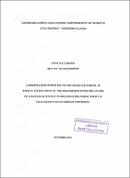| dc.contributor.author | Monday, Eton Lela | |
| dc.date.accessioned | 2022-03-21T12:31:48Z | |
| dc.date.available | 2022-03-21T12:31:48Z | |
| dc.date.issued | 2016-10 | |
| dc.identifier.citation | Monday, Eton Lela (2016) Gender relations and economic empowerment of women in Gulu district- northern Uganda | en_US |
| dc.identifier.uri | https://hdl.handle.net/20.500.12504/918 | |
| dc.description | xiii,70 p. | en_US |
| dc.description.abstract | This study examined the influence of gender.relations on the economic empowerment
of women in Gulu district in Uganda. The study specifically explored the gender
relations affecting economic empowerment the extent to which the gender policy
addresses economic empowerment and the effect of gender relations on economic
empowerment of women. The research design was a cross-sectional survey. A total of
106 respondents, including 8 key informants and 98 employees, participated in the
study. Primary data was obtained using a questionnaire and a structured interview
guide. Data was analysed using descriptive, inferential and qualitative methods.
The findings have revealed that: Gender relations, that encourage women to have free
access to economic resources and that do not restrict women from devoting time to
their businesses were not being promoted in Gulu 'communities the gender relations
were not supportive to women being enterprising. Communities in Gulu including
leaders still hold to the traditional gender orientations that take women as being
biological and universally inferior to men in ways that cannot be changed to enable
women to be enterprising. This orientation· is influenced by the traditional cultural
rules of the generations that have come before them and are restrictive to women being
out of the closet and assuming leading economic and social roles. The gender policy
has not yet helped to change this picture. The policy has largely remained on paper due
to failure by the local governments to fund sensation and education to implement the
gender policy. Policies have not been able to support community programs that
promote gender equality. The local and central government officials have not been
active in starting strategies and initiatives to promote good gender relations. This has
resulted into women feeling inferior and generally perceiving themselves as a weaker
gender. The self defeating attitudes have negatively affected the performance of even
the few enterprises owned by women. Developing emancipative orientations in the
communities and mass expectations of gender responsive and inclusive practices may
increase women's empowerment throughout society:
The study recommends that: The Uganda ·gender policy be geared to promoting
women's rights and tap their enterprising potential. The gender policy should
underscore the role of gender equality in sustainable development at the community
and family level. Community leaders and local governments should be educated the
role of gender equality in promoting women's empowerment. Initiatives to strengthen
women's social participation and empowerment especially at family level should be
popularized to enable women have control over their lives and exert influence in
society. | en_US |
| dc.language.iso | en | en_US |
| dc.publisher | Kyambogo University (un published work) | en_US |
| dc.subject | Gender relations. | en_US |
| dc.subject | Economic empowerment. | en_US |
| dc.subject | women. | en_US |
| dc.subject | Gulu district- northern Uganda. | en_US |
| dc.title | Gender relations and economic empowerment of women in Gulu district- northern Uganda | en_US |
| dc.type | Thesis | en_US |

